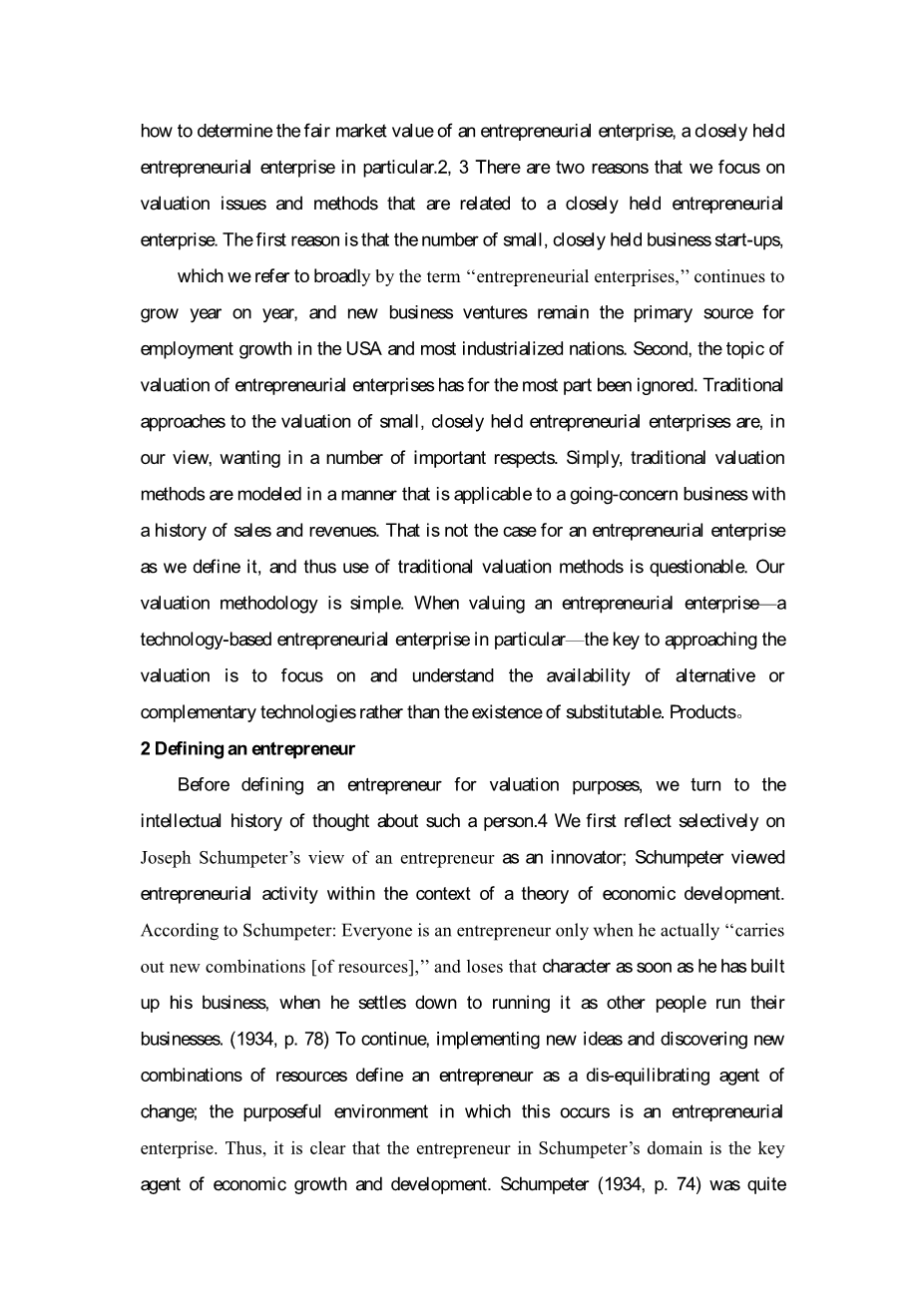

英语原文共 8 页,剩余内容已隐藏,支付完成后下载完整资料
Valuing an entrepreneurial enterprise
David B. Audretsch bull; Albert N. Link
30 November 2011 Springer Science Business Media, LLC. 2011
Abstract This article focuses on valuation issues and methods that are related to a closely held entrepreneurial enterprise. This focus is motivated by the fact that the number of small, closely held business start-ups, which we refer to broadly by the term lsquo;lsquo;entrepreneurial enterprises,rsquo;rsquo; continues to grow year on year, and new business ventures remain the primary source for employment growth in the USA and most industrialized nations. Also, the topic of valuation of entrepreneurial enterprises has for the most part been ignored. The traditional approaches to valuation of small, closely held entrepreneurial enterprises are, in our view, wanting in a number
of important respects. Simply, traditional valuation methods are modeled in a manner that is applicable to a going-concern business with a history of sales and revenues. That is not the case for an entrepreneurial enterprise as we define it, and thus use of traditional valuation methods is questionable.
Keywords Entrepreneurship ·Valuation ·Closely held business
1 Introduction
What makes an individual an entrepreneur, and what makes his or her commercial endeavors an entrepreneurial enterprise? These two questions, especially the former, have occupied the minds of many scholars and practitioners for centuries; the answers to each are as varied as those who have given thought to these questions. Envisioning an entrepreneur even occupied the canvas of Maestro Salvador Dalı acute;,arguably an entrepreneur in his own right. However, we suspect that few self-proclaimed entrepreneurs would envision themselves as Dalı acute; envisioned lsquo;lsquo;The entrepreneur.rsquo;rsquo;We do not attempt to offer a precise construct or definition of either an entrepreneur or an entrepreneurial enterprise in this paper. In fact, others have already trodden that ground.1 Rather, we only offer, as introduction to the valuation theme of this paper, salient characteristics of an entrepreneur and an entrepreneurial enterprise. The primary emphasis in this article is on valuation, that is, on how one thinks about how to determine the fair market value of an entrepreneurial enterprise, a closely held entrepreneurial enterprise in particular.2, 3 There are two reasons that we focus on valuation issues and methods that are related to a closely held entrepreneurial enterprise. The first reason is that the number of small, closely held business start-ups,
which we refer to broadly by the term lsquo;lsquo;entrepreneurial enterprises,rsquo;rsquo; continues to grow year on year, and new business ventures remain the primary source for employment growth in the USA and most industrialized nations. Second, the topic of valuation of entrepreneurial enterprises has for the most part been ignored. Traditional approaches to the valuation of small, closely held entrepreneurial enterprises are, in our view, wanting in a number of important respects. Simply, traditional valuation methods are modeled in a manner that is applicable to a going-concern business with a history of sales and revenues. That is not the case for an entrepreneurial enterprise as we define it, and thus use of traditional valuation methods is questionable. Our valuation methodology is simple. When valuing an entrepreneurial enterprise—a technology-based entrepreneurial enterprise in particular—the key to approaching the valuation is to focus on and understand the availability of alternative or complementary technologies rather than the existence of substitutable. Products。
2 Defining an entrepreneur
Before defining an entrepreneur for valuation purposes, we turn to the intellectual history of thought about such a person.4 We first reflect selectively on Joseph Schumpeterrsquo;s view of an entrepreneur as an innovator; Schumpeter viewed entrepreneurial activity within the context of a theory of economic development. According to Schumpeter: Everyone is an entrepreneur only when he actually lsquo;lsquo;carries out new combinations [of resources],rsquo;rsquo; and loses that character as soon as he has built up his business, when he settles down to running it as other people run their businesses. (1934, p. 78) To continue, implementing new ideas and discovering new combinations of resources define an entrepreneur as a dis-equilibrating agent of change; the purposeful environment in which this occurs is an entrepreneurial enterprise. Thus, it is clear that the entrepreneur in Schumpeterrsquo;s domain is the key agent of economic growth and development. Schumpeter (1934, p. 74) was quite emphatic about this role of the entrepreneur when he wrote, lsquo;lsquo;The carrying out of new combinations we call lsquo;enterprisersquo;; the individual whose function it is to carry them out we call lsquo;entrepreneurs.rsquo;rsquo;5 With this Schumpeterian view of the entrepreneur in mind, we also reflect on the thoughts of Nobel Laureate T. W. Schultz (1975). He defined entrepreneurship simply as the ability to deal with disequilibria.6 Thus, Schultz widened Schumpeterrsquo;s concept of entrepreneurship to include any economic agent who has this ability. Schultz insisted that the supply of such entrepreneurial talent is a scarce economic resource. This view logically raises the question: if such talent is scarce, where does one acquire the ability to deal with disequilibria? Fritz Machlup, who reflected on the general writings of earlier scholars and on the implications of Schultzrsquo;s definition of an entrepreneur, answered this question, at least in part. Machlup argued that formal education, which is largely based on codified knowledge, is not the only source of knowledge upon which an entrepreneur might draw. Rather, knowledge is also gained experientially, and experiential education is often based on tacit knowledge. Individuals can acquire knowledge from their day-to-day experi
剩余内容已隐藏,支付完成后下载完整资料
资料编号:[605315],资料为PDF文档或Word文档,PDF文档可免费转换为Word


